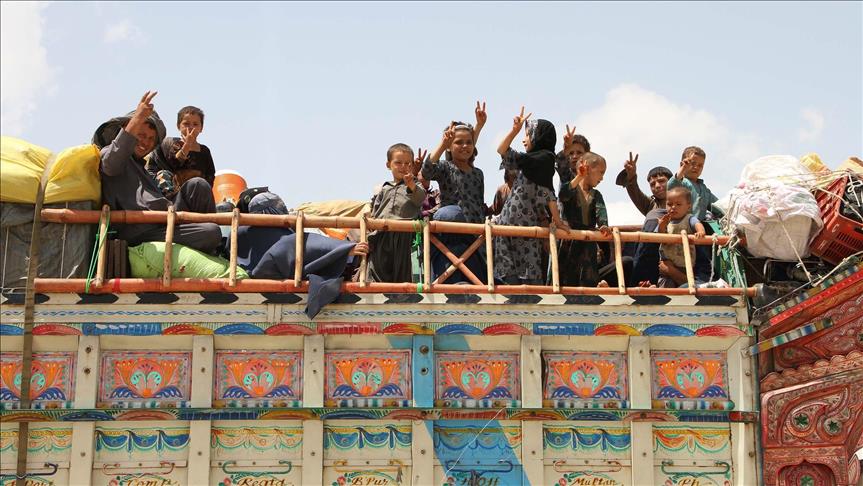Afghan refugees return but struggle to feel at home
After decades away, Afghan refugees struggle to adapt as they return from Pakistan in their thousands
 Afghan refugee families arrive at UNHCR’s registration center, in neighbor Pakistan, at outskirt of Kabul, Afghanistan on August 7, 2016. ( Haroon Sabawoon - Anadolu Agency )
Afghan refugee families arrive at UNHCR’s registration center, in neighbor Pakistan, at outskirt of Kabul, Afghanistan on August 7, 2016. ( Haroon Sabawoon - Anadolu Agency )
Kabil
By Shadi Khan Saif
KABUL, Afghanistan
Khairullah was a young boy when he rushed with his parents towards Peshawar, over the border in Pakistan.
They were escaping the bloodbath engulfing their country more than three decades ago, when the Soviet invasion of Afghanistan forced the first of several waves of refugees.
Like Khairullah, most chose to go eastwards, to a society close to their own in culture and religion and where they lived in relative peace over the years. Now, he says, that period has found a bitter ending.
"For years, we never felt any difference between us and them but lately the Pakistani police made our lives miserable in Peshawar," Khairullah told Anadolu Agency. He returned to Afghanistan in the first week of July, this time with his wife and four children.
He was part of a convoy of trucks loaded with whatever belongings returning families could bring with them. Their first station in their home country was a U.N. refugee registration camp, on the outskirts of the Afghan capital, Kabul.
According to the U.N. High Commissioner for Refugees (UNHCR), around 30,000 refugees have returned in the last two weeks along. Each registered Afghan refugee was paid $400 to help them settle back into their own country; the only pull factor for many of the returnees.
"We are happy that the aid money has been increased from $200 to $400 but we request our government help us build homes and find jobs", Khairullah said, adding that despite persecution in Pakistan, coming back to their home country was a difficult experience.
Hasti Gul, another former refugee from eastern Logar province said it was a struggle to adapt to Afghanistan after decades living as a refugee.
"I was born and raised in Pakistan, I made friends there that I miss now," said Gul. "Three decades is a long time, our ancestral homes in Logar are destroyed by the rage of war, what will we do if we go back there?"
Gul alleged, however, that their fragile status in Pakistan was also open to being exploited by police, recalling police once raided his home and arrested him, his father and elder brother.
"They used to do this to every Afghan, they bundled us in a van and along the way set us free after beating and abusing us and snatching all the money and valuables we had," he said.
Returning refugees claimed they each had to pay bribes to Pakistani border forces to allow them to carry their belongings; wood, animals, trunks and utensils for their homes.
Pakistan has now identified the end of the year as its deadline for repatriating Afghan refugees but a police crackdown still followed the initial June deadline and forced thousands to quickly sell their homes and prepare to leave, while others went into hiding in other parts of Pakistan.
Much of the western part of modern-day Pakistan shares strong cultural links with Afghanistan having been part of greater Afghanistan before British rule of India. Most Afghan refugees in Pakistan are ethnic Pashtuns, a community split by the Durand Line, the de-facto border set in 1893 by an agreement between a British diplomat and the Afghan King.
Political analyst Atiq Rahman said refugees have borne the brunt of relations that deteriorated after cross-border skirmishes at the Torkham crossing point last month killed soldiers on both sides.
He said the Pakistani provincial government of Khyber Pakhtunkhwa, in particular, ha e fuelled anti-refugee sentiment after the Taliban killed over 150 people, mostly children, at an army-run school in the provincial capital of Peshawar on Dec. 16 2014.
Hafeez Ahmad Miakhail, spokesman for the Ministry of Refugees and Repatriation, said efforts are underway to support repatriating families and more than 1,000 refugees are returning from Pakistan on a daily basis. He said the government is considering a proposal to allocate a residential plot to each returning family in safer parts of the country.
Earlier this year, the Afghan government requested Pakistan extend the stay of refugees because many areas of Afghanistan were still witnessing serious high levels of violence where the Taliban, and now fighters claiming loyal to Daesh, continued to attempt to seize control from government forces.
Anadolu Agency website contains only a portion of the news stories offered to subscribers in the AA News Broadcasting System (HAS), and in summarized form. Please contact us for subscription options.







